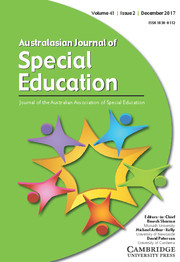Article contents
Professionals’ Guidance About Spoken Language Multilingualism and Spoken Language Choice for Children With Hearing Loss*
Published online by Cambridge University Press: 12 May 2016
Abstract
The purpose of this research was to investigate factors that influence professionals’ guidance of parents of children with hearing loss regarding spoken language multilingualism and spoken language choice. Sixteen professionals who provide services to children and young people with hearing loss completed an online survey, rating the importance of a range of potential influences on the guidance they provide to parents. These participants were invited to comment on the importance of these influences. Participants included teachers of the deaf, speech-language pathologists, special education teachers, psychologists, auditory-verbal therapists, Auslan interpreters, and curriculum coordinators. All participants had experience working with multilingual families and reported that they would sometimes or always recommend multilingualism for children with hearing loss, with fewer reporting that they would sometimes recommend monolingualism. Professionals placed greater importance on factors relating to family and community considerations (e.g., family language models, communication within the family, community engagement), and less importance on organisational policy and children's characteristics. This research provides an initial insight into the factors that professionals consider when guiding parents around spoken language and spoken language multilingualism decision-making for their children with hearing loss.
Keywords
- Type
- Original Articles
- Information
- Copyright
- Copyright © The Author(s) 2016
Footnotes
This manuscript was accepted under the Editorship of Michael Arthur-Kelly.
References
- 10
- Cited by


